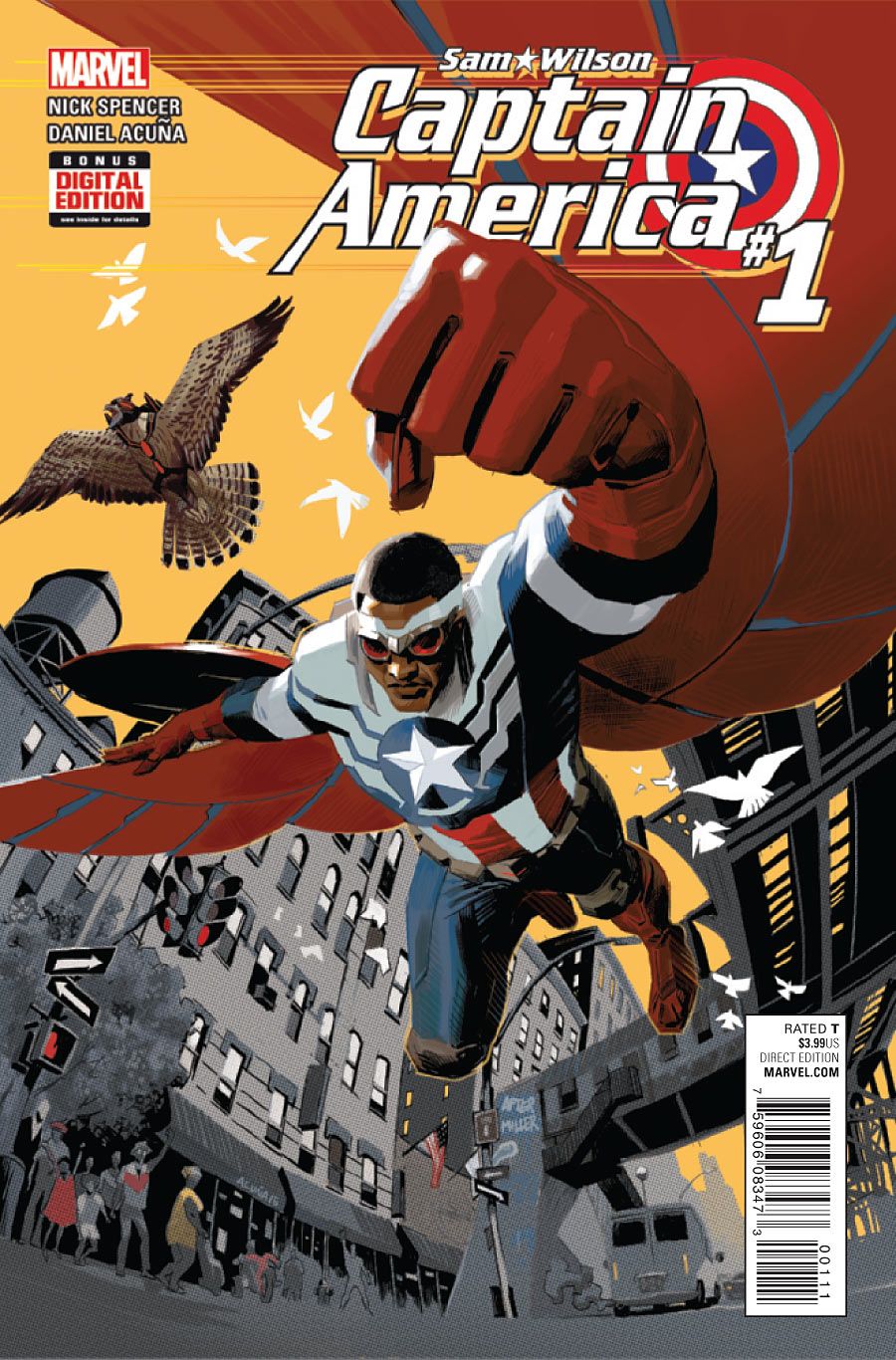In Nick Spencer and Daniel Acuña's "Captain America: Sam Wilson" #1, Sam leaves S.H.I.E.L.D. and strikes out on his own. The story is split into two timelines, alternating between Sam stuck in a middle seat on a long flight and flashbacks to the recent past. The plane scenes emphasize the down-to-earth parts of Sam's personality as he deals with TSA and annoying seat neighbors, and the flashback sequences trace his most recent evolution in identity.
The large amount of voiceover captions detract from the immediacy of the action. Parts of "Captain America: Sam Wilson" #1 read more like a memoir than an action comic. Despite this, Spencer creates a strong voice for Sam and a new direction for his character. Sam speaks directly to the reader, and he comes across clearly as an ethical, thoughtful hero, capable of handling a bigger spotlight and more responsibility.
The past and present converge neatly in the final scene. The last page cliffhanger feels inevitable, especially considering Spencer's themes of self-definition and whether it's a citizen or hero's duty to speak up. It still has surprise value, too, because the confrontation and reckoning have arrived earlier than the reader might expect. From panel-to-panel, the structure and pacing is tight. The unfiltered response Sam gets to his "Take It To The Hotline!" offer is hilarious but predictable, but the sudden pivot to a request with real urgency has a huge dramatic punch.
All the back and forth has the potential to be confusing, but Acuña's art and colors make for clear transitions. His pacing and cleverness carry Spencer's jokes, which are concentrated in the gutters. The first transition from the tequila caps to the red lenses is visually clever, but the second one -- linking the stewardess' expression to Maria Hill's -- is even better. His facial expressions and body language are excellent and feel composed of muscle and movement, instead of looking like still photographs. The color palette sticks closely to a red, white and blue baseline without looking drab or boring.
Acuña's work is strong with the exception of the scenes with Misty Knight. The cropping of panels often oversexualizes her, and Acuña's facial expressions for her are strangely stiff. Sam and Misty are supposed to be close, but the scenes between them don't show any chemistry, friendly or romantic.
The single biggest weakness of "Captain America: Sam Wilson" #1 is how Spencer tells the reader things instead of showing them. Spencer is very open about his politics; one glance at his Twitter feed will reveal his progressive stances. Sam's political awakening and independence are appealing and sympathetic, and the issues Spencer raises couldn't be more timely and relevant. However, just telling the reader what he thinks about racism and immigration doesn't equate to good storytelling for Sam Wilson. There's no moral ambiguity.
In particular, the characterization for the villains is weak, because Spencer doesn't want the reader to take them seriously at all. The speech made by the Sons of the Serpent leader is over-the-top. It repeats the beliefs of the anti-immigration crowd, but in a mocking, histrionic tone with unrealistically elevated, pompous-sounding syntax, as if they were the Knights Who Say Ni. This is a problem, because Spencer doesn't quite hit the satiric sweet spot of "The Onion" or "The Colbert Report." His contempt for anti-immigration sentiments is too open, and his portrayal of them is too shallow for his criticisms to draw blood. Spencer doesn't do a great job of preaching to the choir, and he does an even worse job of getting readers to think or change their minds.
Spencer's political approach is driven by obvious passion and sincerity.
He wants Sam Wilson to think about what a hero stands for as well as what America stands for. His injection of politics into what is usually a rah-rah narrative adds heart and depth without getting too dark.
However, he leans too far towards telling the reader what to think, instead of gently leading the reader to form conclusions for themselves about hot-button issues and right vs. wrong. This isn't the place for a philosophical treatise or a political column. The story has to come first, and it's weakened by a lack of moral complexity on the "bad" side. Even with those flaws, though, "Captain America: Sam Wilson" #1 has excellent artwork and it manages to be funny and provocative. I'm looking forward to the match up in the next issue.

